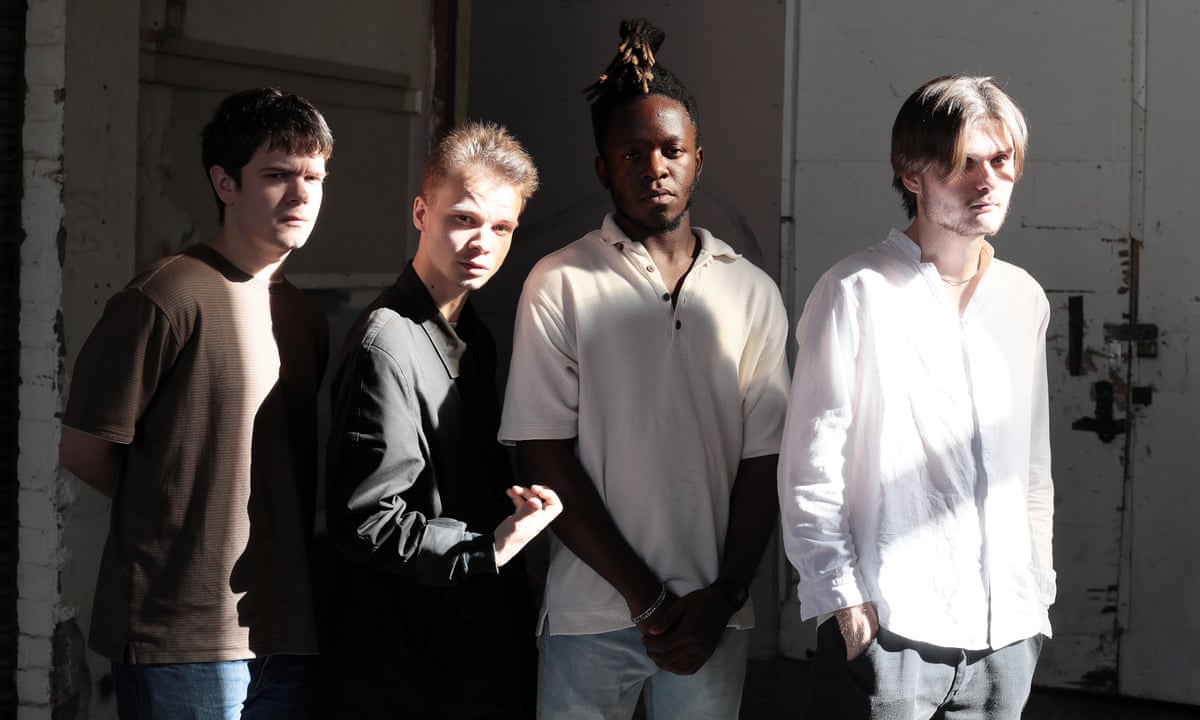A typical black midi show looks something like this. The stage is minimal, maybe even bare. Besides a couple of amps and some equipment, it’s a blank canvas. On the far right side of the stage, we see a shirtless young man sporting nothing but Ray Bans and cargo shorts and sweating profusely, beating the absolute dickens out of a drum set with two firearms coming out each side of his torso you would be understating to call ‘arms’. On the other side of the stage, we see a twenty-something with the appearance of a fifteen-year-old who just got pulled out of Algebra 2 with an analog synth right to his right and a Rickenbacker bass across his chest that he is vigorously striking so hard, it looks like he’s trying to break it. And in between these two we see the frontman, dressed in what can only be described as “80s rom-com male lead attire”–middle part hair, trenchcoat, Italian shoes–punishing the strings on his guitar and babbling inflamed nonsense into the microphone for a sweaty moshing audience that is absolutely loving it.
From just the broad critical acclaim to the band’s eager fanbase, London’s black midi undeniably stands to be one of the most exciting and intriguing acts in rock music today. The band’s 2019 debut record Schlagenheim (via Rough Trade) was a thrilling mix of math rock virtuoso, blood-curdling morbidity, and young unbridled creativity packed into an airtight forty minutes. Each song on the record managed to simultaneously sound like something and nothing we had ever heard before. From the freaky no-wave vocals freakouts of frontman Geordie Greep, to the breath-taking mastery of drummer Morgan Simpson, to the electric chemistry allowing the band to turn on a dime, the debut’s rich tracklist shook the experimental rock scene like no other album in years. The album effortlessly melds influences across like pop, punk, rock, and r&b to make something brand new.
Since then the band has gone through some changes in their career that would affect their new album, Cavalcade (via Rough Trade). Firstly, guitarist Matt Kwasniewski-Kelvin left on indefinite hiatus at the top of the year for mental health reasons. Secondly, the band has seen a massive spike in popularity following the debut, with international tours, name-breaking feature pieces, and appearances at festivals which fans expected to put pressure on the band’s chemistry. And thirdly, the band just got bored with their sound. In various interviews, the members talk about wanting to go outside of the box with the next album. Greep told the NYTimes, “I think it’s better to go crazy, full crazy, and fail, than just do something you know you can do.”
Like its cover would imply, Cavalcade is complex, distorted, and colorful. The album’s sound comes from a basket case of influences, from experimental pioneers like Miles Davis and CAN to pop legends like Amy Winehouse and Marvin Gaye as well as new age rockers like the Mars Volta. Like its eclectic mix of influences, the album is all over the place. Each song explores a different side of the band’s budding sound. But while the album’s sounds are spread out, the overarching themes of decline and death haunt each track, attaching the tracks together into a holistic work.
Cavalcade kicks off with the head-splitting “John L,” a skittering avant-prog banger that leads with this oppressive, pummeling rhythm that beats on your chest like an alarm. Without indulging into hyperbole, this track is one of the wildest things I’ve heard all year. The song marries piercing guitar and saxophone leads over a punky snare march like the fanfare of some terrifying neo-fascist parade. The verses feature imperative vocals from frontman Greep and cuts between these gut-wrenching moments of silence that make the listener’s stomach churn. Greep’s vocal style matches seamlessly with the lyrics. Lyrics that paint the tale of a nationalistic cult leader drawing in followers with reactionary politics only to be swallowed up in the second half of the song by the climate of violence he created himself. The proggy interlude is sinister yet indulgent. With its violent time changes and instrumental freakouts, it feels like a modern incarnation of a “21st Century Schizoid Man.” As the opener, black midi wants you to know from the get-go that this album is going to be crazy.
The following track “Marlene Dietrich” is a complete tonal change from the preceding song. Running with this calm and assuring jazz-pop beat, “Marlene Dietrich” matches the tone of titular 1920s German superstar the song is named after. The warm orchestral instrumentation helps build the image of singer Dietrich pouring her heart out on stage only to receive no applause from a tough audience. In contrast to Greep’s vocals on the last track, this performance feels operatic, exuding the belting elegance of the 20s jazz style to song calls back to. The instrumental is warm and comforting, like something that wouldn’t sound out of place in an artisan coffee bar.
The mood shifts back into punky territory with “Chondromalacia Patella,” a two-faced post-rocker that centers around these rhythmic motifs most reminiscent of the songwriting style on their first record. But unlike the jam-centric attitude of the first record, Cavalcade’s songs are much more deliberate, and the structures are more refined, showing the band’s hyper-focus on the experience as opposed to how it feels to them as performers. “Chondromalacia Patella” is a great example of this. After the infectious intro begins this 3-minute long incline of peaks and valleys teasing between jazzy delicacy and blunt trauma like a wrecking ball swinging back and forth on its chain. The song climaxes into this high octane post-punk outro that vigorously builds only to resolve with the slide whistle-like synth that feels like the band laughing in your face for staying this long.
“Slow”, titled for its lyrics, certainly stands out as the darkest on the record, tackling the unbearable pain of waiting until death. This song is not for the faint of heart and its structure mirrors changing attitudes of what it’s like experiencing this pain: stomach-churning ennui to violent anger at having to keep breathing. This song is one of two on the record that features the vocals of Cameron Picton, whose boyish deadpan delivery sounds like a kid so steeped in depression that he can’t even muster the energy to do anything more than a whisper. The instrumentation is dynamic and expertly builds up to the climax which brings back the main riff in full swing, pummeling on your head like your skull is closing in on you. Certainly one of the most powerful tracks on the album.
In the second half of the album, listeners hear a musical shift on the kind of aspects that black midi has been accentuating on Cavalcade. While the first half of the songs mainly focused on ground-shaking rhythms, the second half centers its songs more around its harmonies. Firstly on “Diamond Stuff,” a lengthy cavernous build-up of isolated guitars into the most beautiful crescendo black midi has ever made, with tenuous guitar notes that linger like twinkling stones in a dark cave. As Picton’s lamenting vocals guide it into the second half, Simpson’s dense drum fills and warm strings instill an air of starry-eyed awe into the listener. The whirring instrumentation inflates and contracts, feeling like gusts of winds that send chills of wonder down the listener’s spine.
It’s at this point that I can’t go any further without mentioning Cavalcade’s hidden hero Kaidi Akinnibi, whose contributions on tenor saxophone elevate black midi to full-fledged jazz fusion mastery. “Dethroned” opens with Akinnibi’s warm saxophone lines which until this point, have mostly been claustrophobic freakouts, but exudes the tenderness and focus of a spiritual jazz auteur on this track. The song tells the tale of a fall from grace and the victim’s struggles with accepting defeat. The track’s steady incline into this thrilling climax is where Simpson’s breakbeat rhythm, Picton’s confrontational bassline, and Greep’s overdriven guitar make way for Akinnibi’s soaring sax lines which shoot over the mix like beams of light through the sky. This song is a thrill and certainly will be exciting to see live.
black midi is the kind of band that can’t go through a set without reminding you that they care, but not, like, too much. And that effort to keep things fun and not too pretentious manifests on Cavalcade in “Hogwash and Balderdash” which in British vernacular literally means “nonsense and nonsense.” The beat is urgent but silly with an unruly beat as well as an indecisive guitar line that sounds like jazz-punk for clowns (and not the Oingo Boingo kind). Between its wild synth static, cartoony bridge melodies, and Greep’s tongue-in-cheek anecdote about two convicts in escape from the law, this song is chaotic yet, it works. It’s obtuse and horrid at times, but with multiple listens I’ve warmed up to its silly attitude and the band’s full-send commitment to make a nonsense track.
“Ascending Forth” is the epic thesis statement closer to Cavalcade. The ten-minute track is populated with rich harmonies between organs, horns, keys, guitars, and a gallery of strings. The song shifts through several cycles of tension and contraction to tell a story about a man who is condemned for creating art outside of social norms. Named after the ascending fourth, a harmonic interval popularly used in many pop chord progressions, the song’s main character Markus spends his days writing kitschy material recycling this same interval over and over. “Ascending Forth” nails this concept so hard by putting its verses in progressive jazz progressions while its lulling chorus is, in fact, in ascending fourths! As the song goes on, Markus is put to trial for writing music progressing out of the boundaries, artistically “ascending forth,” if you will. The matching mood of the instrumentation is cinematic and climaxes at the final moments of the song to bookend the album in a wonderfully grand fashion.
Cavalcade is a tough record. And within the current boundaries of what we all “rock music,” it’s an odd fit. There aren’t really any four-on-the-floor grooves here. There are no pop harmonies. There are no foot-stomping arena choruses. But like any great rock album, it pushes what we consider “rock music” to its limits. It takes what was there, strips it to its bare essentials, and sees how far you can change it. These most basic concepts of rock music–guitar licks, kick-and-snares, tension, and release–are both what drives this record and also what grounds it in a long lineage of boundary-pushing rock musicians who tried what they did just like black midi did here.
black midi’s Cavalcade is a wonderfully eclectic sophomore record with tastes of jazz fusion, post-punk, and avant-prog. The album does what so many of the greats do, widen artistic boundaries, display musical virtuoso, and deliver a damn good time in a thrilling 40 minutes.
black midi’s new album, Cavalcade is available where all music is streamed including Spotify, Apple Music, and Tidal. To purchase the album visit Bandcamp.
What did you think of the album? Be sure to let us know below in the comment section. Want more black midi? Connect with the band across your favorite social media platforms including Facebook, Twitter, and Instagram.







